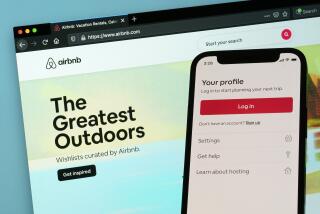8 steps to safer travels
- Share via
My first question about Wi-Fi used to be whether it was free. That was before my Facebook and Gmail accounts were compromised. Now I surf with protection.
“We leave breadcrumbs wherever we go,” said Robert Siciliano, the identity theft expert for Hotspot Shield, a free (with ads) or paid Virtual Private Network, or VPN, app for iOS, Android, Mac and Windows devices that cloaks your actual IP address.
“In the hands of the wrong person, data could be used to track us,” said Siciliano, who has worked in personal security for more than 25 years.
Here are Siciliano’s tips for safer travel from the Web to the shared economy with providers such as Zipcar and Airbnb.
Internet: Surf using VPN protection and change your passwords at least every six months. Get a software program that stores, saves and creates passwords. Siciliano has more than 650 passwords but remembers only critical ones. He recommends MacAfee Livesafe for its password manager, virus and spyware protection.
Rental cars: Whether it’s from Zipcar, Hertz or another place, a rental car’s GPS navigation history needs to be wiped. Siciliano recommends using navigation apps on your smartphone that you already know how to work.
Ride services: When you get picked up by Lyft or Uber or another ride service, make sure the person is who he or she claims to be. Ask to see a driver’s license or ask a few questions to get an impression before you get in. Siciliano sizes up cabbies too.
Airbnb or similar private-home lodging services: Ask questions. Do not be afraid to call a host up to vet him or her. Check the reviews.
Posting to social media: If you must post to Facebook, post in the past tense, Siciliano says, rather than advertising your absence.
Follow us on Twitter at @latimestravel
More to Read
Sign up for The Wild
We’ll help you find the best places to hike, bike and run, as well as the perfect silent spots for meditation and yoga.
You may occasionally receive promotional content from the Los Angeles Times.






